#old french
Text
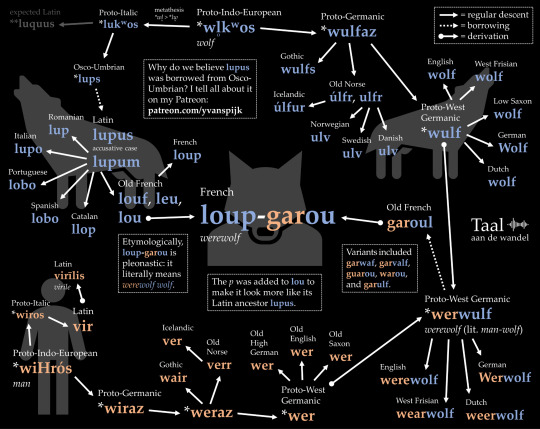
The French word for a werewolf is loup-garou. Etymologically, this compound is pleonastic: garou means 'werewolf' and loup means 'wolf'. It's also hybrid: loup stems from Latin lupus whereas garou was borrowed from West Germanic *werwulf. Click the image for more.
#historical linguistics#linguistics#language#etymology#english#latin#french#old french#proto-germanic#proto-indo-european#proto-italic#proto-west germanic#lingblr#werewolf#werewolves
989 notes
·
View notes
Text
♰ ꓹ old french names. ── ── fem , masc.

feminine.
marie ꓹ jeanne ꓹ marguerite ꓹ yvonne ꓹ madeleine ꓹ marcelle ꓹ marth ꓹ lucienne ꓹ renee ꓹ helene ꓹ josephine ꓹ lucie ꓹ fernande ꓹ gabrielle ꓹ angele ꓹ odette ꓹ therese ꓹ augustine ꓹ elise ꓹ blanche ꓹ francoise ꓹ cecile ꓹ genevieve ꓹ emilianne ꓹ mathilde ꓹ leontine ꓹ claire ꓹ julienne ꓹ irene ꓹ amelia ꓹ amelie ꓹ aline ꓹ camille ꓹ aimee ꓹ victorine ꓹ reine ꓹ rosalie ꓹ francene ꓹ clemence ꓹ solange ꓹ valentine ꓹ augusta ꓹ alphonsine ꓹ celine ꓹ clementine ꓹ clotilde ꓹ philomene ꓹ celestine ꓹ felicie ꓹ irma ꓹ rosa ꓹ caroline ꓹ elisa ꓹ alexandrine ꓹ ida ꓹ therese ꓹ simone
masculine.
fabien ꓹ germaine ꓹ gautier ꓹ valeray ꓹ antoine ꓹ andre ꓹ edouard ꓹ roch ꓹ amoux ꓹ lothaire ꓹ thiery ꓹ clement ꓹ armand ꓹ cyril ꓹ didier ꓹ florent ꓹ gilles ꓹ gustave ꓹ matthieu ꓹ valentin ꓹ yanis ꓹ luc ꓹ loris ꓹ rene ꓹ regis ꓹ emeric ꓹ marcel ꓹ laurent ꓹ ambroise ꓹ sacha ꓹ nael ꓹ basile ꓹ amir ꓹ albin ꓹ gauthier ꓹ verdell ꓹ arsene ꓹ sylvain ꓹ aymer ꓹ olivier ꓹ jehan ꓹ sanson ꓹ perceval ꓹ rolant ꓹ guillame ノ guillalme ꓹ estiene ꓹ charlon ꓹ franceis ꓹ jasque ꓹ peire ꓹ loeis ꓹ lohier ꓹ yvain

#* hemlocke.#name help#name list#name ideas#name suggestions#names#old french#french#masculine#feminine#mogai blog#pro mogai#actually mogai#mogai positivity#mogai#rph resources#rph#rpc resources#rpc#rp#rp resources#resources
2K notes
·
View notes
Text
question
what's Old or Norman French for "human"
169 notes
·
View notes
Text

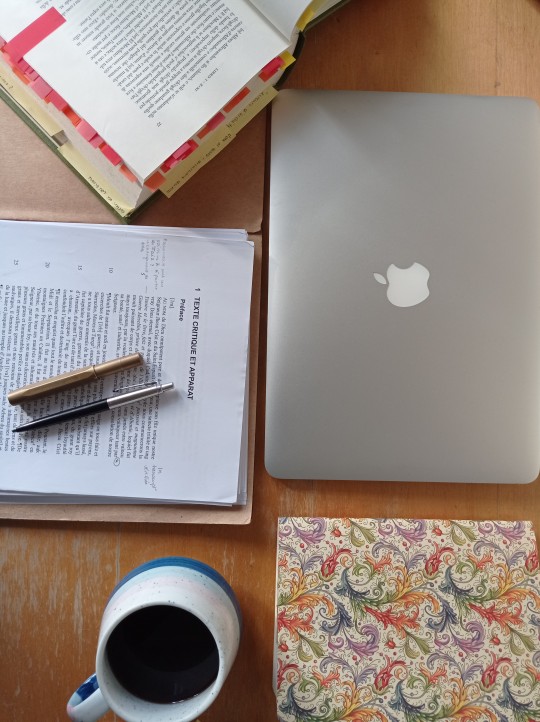
November 28th, 2022 | I set a deadline for myself, that I would send two parts of my thesis to my advisor by the 30th of November. Let's hope I can make it 🤞
692 notes
·
View notes
Text
candy
late 13c., "crystallized sugar," from Old French çucre candi "sugar candy," ultimately from Arabic qandi, from Persian qand "cane sugar," probably from Sanskrit khanda "piece (of sugar)," perhaps from Dravidian (compare Tamil kantu "candy," kattu "to harden, condense").
25 notes
·
View notes
Text
Daily Etymology #147
Quilt
Quilt came from the Middle English quilte, which referred originally to a mattress stuffed with wool or down. The meaning of bed covering was first recorded in the 1590s. Quilte came from the Anglo Norman quilte, from the Old French coilte, meaning cushion or quilt. Coilte itself was derived from the Latin culcita, meaning mattress or cushion, of unknown origin.
89 notes
·
View notes
Note
are the Zs in old French like how modern Europeans will sometimes say that when Québécois people say 'dzu'? the 1st association I have w Québec/older pronunciation is the infamous 'toé' etc. which sometimes makes older fancier songs w accurate pronunciation sound casual & slangy to my ear. but that's not Old French, just French that is not current-day French. lol I was going to say more but I realized how hard it'd be to explain the pronunciation stuff i wanted to say purely through text. RIP.
i don't know enough about québécois french to answer this tbh, i have only ever learned france french and have only had the briefest exposure to québécois french online
the Z in old french are just.... idk there's just a lot of them? like they're all over the place. in the middle of a word. at the end of a word. Zs on the left, Zs on the right, can't escape them, they're all over the place
some of them are still in modern french. others have become an S eg sanz -> sans, vodrez -> voudrais, etc. old french just really likes them
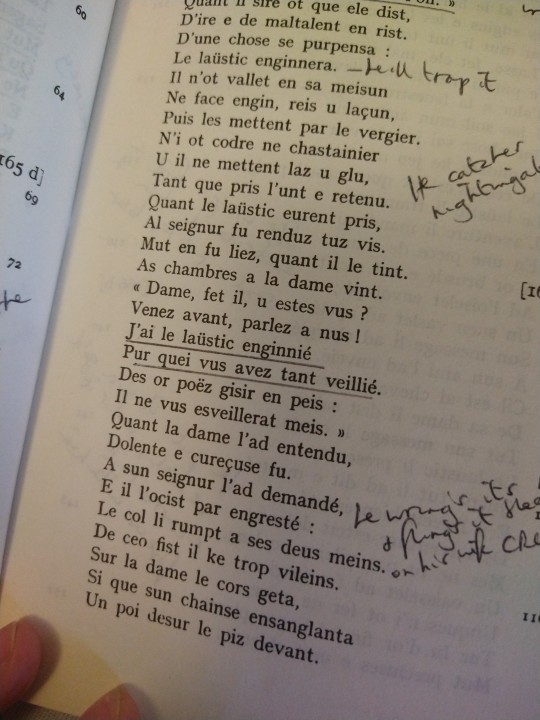

(apols for the annotations, I got these secondhand)

idk i just feel Z is too funky a letter to be throwing it around like that. Zs should be saved for special occasions. you can't just chuck them in every other word
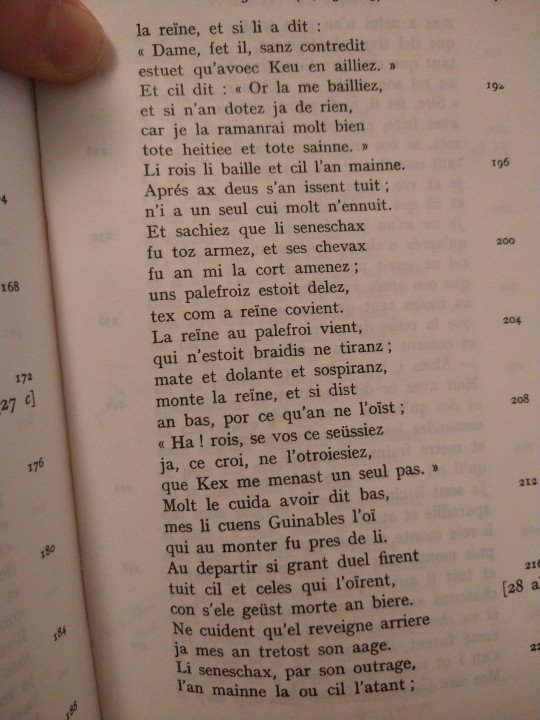
also. "kex".
cai does not deserve this.
#books are les lais de marie de france and le chevalier de la charrette respectively#since they are the old french i happened to have on hand#old french#answered#anonymous
25 notes
·
View notes
Text
here's a love letter in the form of a poem to all the obscure dead languages out there and the people who love them.
here's for dying languages!
the bloodstains between the letters,
the rips in their vocab lists,
never to be sutured up.
Here's for old languages!
never to be heard by a native speaker again.
#tagamemnon#ancient rome#langblr#breton#etruscan#hittite#uhh a lot more#ancient chinese#sanskrit#latin#ofc#ancient greek#old french#too many to name#akkadian#old norse#carolina Algonquian#etc etc etc#i just love them okay!!! they're like the weird old uncles of the language world who sit in the shadows and just watch and tell old stories
17 notes
·
View notes
Text
Hello my friends! Anyone know of any online Old French and/or Occitan programs?
#im including occitan bc one of my committee members suggested it#though i talked to another grad student about it and she was like...i think you need old french#language#french#occitan#old french#medieval#medieval studies#gradblr#phdblr#idk what other tags are helpful here#jam posts
28 notes
·
View notes
Note
I have a question that has absolutely nothing to do with fic or the Sandman except for the bit where it's about a dream poem!
Since you've minored in French literature, I was wondering if you've read Le Roman de la Rose? As far as medieval dream poems go, Chaucer and even Lydgate can take a back seat because the first part of Le Roman (aka the part written by Guillaume de Lorris c. 1230) is fantastic and contains some of my favourite language ever. The God of Love makes the Lover kiss his mouth which drives me crazy, but these lines are my favourite in any literature ever and honestly this entire ask is me just jumping on the chance to share them/write them out again (the English translation is by Charles Dahlberg):
lors la me toucha au costé
et ferma mon cuer si souef
qu'a grant poine senti la clef
then he touched my side
and locked my heart so softly
that I hardly felt the key
I have not - furthest back I was ever sent was late 17th c.
However, after recovering from being absolutely fucking bodied by those lines, I wanna read it. I've done a semi-cursory search and have only found it in English translations, and a French journal article about how many manuscripts there's been of Le Roman de la Rose (answer: a great deal) but I would love even the Guillaume de Lorris portion? I am hooked. thank you for this. a small digression *I* am jumping on the chance to talk abt:
This is a good example of a funky little modern French thing, which is pronouncing the vestigial -e (there's actual terms but I like vestigial) that would otherwise be silent (for the most part, regionally, asterisk asterisk etc.,) in speech, in prose - but are pronounced in poetry and song. Francophones are like 'it's for meter' (as above in poine, to make the line 8 syllables) but as usual they are being incredibly blasé about a very cool linguistic convention. Why is it cool? It's a remnant of both our language's histories! It used to be our convention too!
As anyone who has read Middle English in Dreamling fic, completely new to it, as I was, you will notice the profusion of seemingly vestigial -e's. While spelling was not standardized, there's overall more of them on words today we might recognize which have since shed them completely, like the classic myne owne hertis rote (x), my own heart's root. If you're an Anglo like me, you might read that and pronounce it something like 'mine own heart-iss wrote'. BUT! Guess the fuck what - just like in French poetry even today, these final e's were pronounced for the majority of what we call 'Middle English'. Here is someone reading some of Chaucer's Canterbury Tales in Middle English. It's so jaunty, eh?
Unlike the French, we have obviously not kept the habit of pronouncing our now-vestigial -e's, even in spoken verse. (or, if u will, vers-uh) I think it's a crying shame. The music of it! The rhythm! The connection with your linguistic ancestors! My tinfoil hat thesis that is objectively incorrect but feels right: we doomed this gorgeous facet of English pronunciation in the rise of literacy and printing; if we still primarily transmitted stories via oral tradition they would sound prettier. The French kept it because they relied on it too much in their poetry are simply more stubborn and consistent.
On that theme, I think it's crazy how much more comprehensible Old French is relative to modern French, than even Middle English a few centuries later vs modern English?? What's up with that?
p.s. any asks that are like 'here's some ruinous language I would like to share with you' are very welcome they don't even have to be dream poems!
p.p.s. more on Middle English pronunciation from someone that might know what they're talking about because I certainly do not (x)
#asks#poetry#this can be a poetry blog on sundays#as a treat#linguistics#translation meta#middle english#old french#language i love thee so#do kids still speak pig latin to each other in school? hmm#an essay
30 notes
·
View notes
Text
The word for 'I' has many different forms in the Romance languages, such as French je, Italian io, Portuguese eu and Spanish yo. Yet all these forms stem from one Latin word: egō. Here's how egō step by step changed into a selection of its Romance descendants.
People who subscribe to my Patreon get access to extra information further explaining what you see on the infographics and videos. To give you an impression, here's the text that goes with this video.
How did these forms originate?
Latin, Late Latin and Sardinian
Around the second century AD, the [g] sound of Latin egō (as in English go) started to weaken. It became a fricative sound similar to the one in Modern Spanish agua 'water'.
In this form, with only minor vowel changes, it survived until this very day in certain Nuorese dialects of Sardinian: ego. These geographically isolated dialects are known for being the most conservative descendants of Latin. Their most notable trait is the conservation of the Latin [k] and [g] sounds before i and e: Latin centum '100' with [k] became kentu, whereas in Italian it became cento with the [tʃ] sound of English check, and in French, Portuguese and many variaties of Spanish it respectively became cent, cento/cem and ciento/cien with [s].
In a Late Latin text from the 6th century, we encounter egō as eo. By this time, the consonant had been dropped. It's this form that's considered Proto-Romance, i.e. the form that gave birth to all descendants except the form in the Nuorese dialects I discussed above. Eo even remained practically intact in a number of other Nuorese dialects.
Portuguese and Romanian
In Portuguese and Romanian, the -o of eo became w-like: eu. However, the Romanian spelling hides the diphthongisation of [ɛ] to [jɛ], later [je]. Cfr. ferrum > fier, and pellem > piele.
Italian and Neapolitan
In Italian, [ɛ] became [e] and then [i], a sound close to it: io. This sound change didn't only happen in this word: compare mio 'my' (from Old Italian meo) and Dio 'God' (from Deo) with Portuguese meu and Deus. In Neapolitan, the -o weakened and became the schwa sound of English words like roses.
Spanish and French
The form io must have also existed in the distant ancestors of Spanish and French, but there, [i] didn't stop changing: it turned into a [j], its consonantal counterpart. In both languages, this [j] eventually underwent fortition: it became a stronger consonant similar to the one in English joke, which eventually weakened again in Modern French je.
In South American Spanish, interesting things are happening. The sound change that yo pronounced as [ʒo] has undergone in the Rioplatense dialects in Uruguay and the southern part of Argentina is called zheísmo, and what's happening in Buenos Aires and spreading through Argentina is called sheísmo: [ʃo].
#historical linguistics#linguistics#language#etymology#latin#french#spanish#old french#old spanish#romanian#sardinian#portuguese#italian#proto-romance#video#audio#lingblr#late latin
704 notes
·
View notes
Text

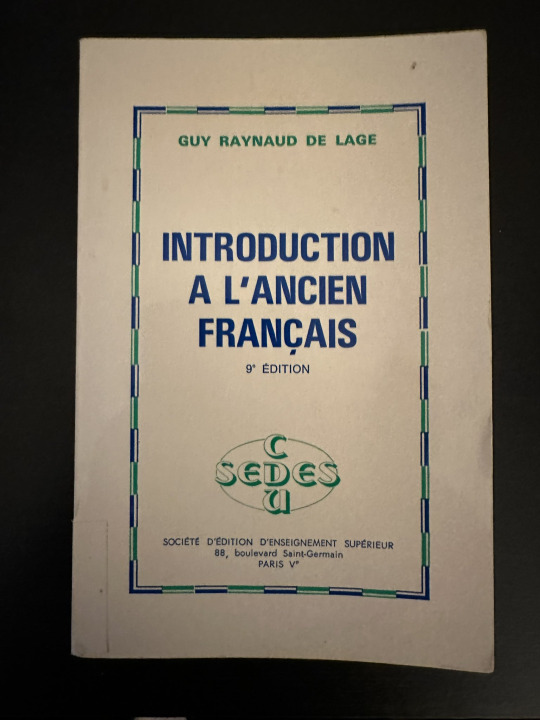
me + a book that i recently got (:
2 notes
·
View notes
Text
Please enjoy this adorable old French lady talking to a penguin. (Reposted from the marvelous Instagram account @dailybirdshow)
#penguin#galapagospenguin#birds#penguinsofinstagram#french#adorable#old french#sweet old lady#je t’aime#tu es mon préféré
2 notes
·
View notes
Text


July 29th, 2022 | Editing is going quite well and I'm uncovering interesting facts about the text. Also had to go back to the Song of Aspremont to check some facts, which is the first text I've ever edited back in 2019 and my bachelor's degree... It's weird but also kind of nostalgic!
78 notes
·
View notes
Text
youtube
This is so pretty, I thought you might like that. ☺️🎶
It's Mittelhochdeutsch (Middle High-German) and this song is from the 13th century. I think it is very beautiful and catchy and I enjoy listening to it, the lyrics here are given in English as well in the video! The song is called "Der wahter sanc von minnen wol". I've also been listening to songs in Middle English and Old French and I'm so in love! 🥰
#Medieval#Medieval music#Minnesang#Music#Beautiful#13th century#Middle high german#Middle English#Old french#Languages#Minne#Der wahter sanc von minnen wol#elegant#Melodious#Youtube
0 notes
Text
Daily Etymology #145
Ferret
Ferret comes from the Old French furet, a diminutive of fuiron, of the same meaning. Fuiron was derived from the Vulgar Latin *furritum, meaning weasel or ferret. *Furritum came from the Latin fūr, meaning thief, so *furritum directly translates to 'little thief'.
* Indicates a reconstructed word
94 notes
·
View notes